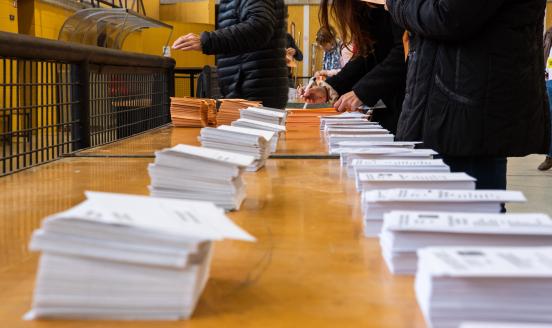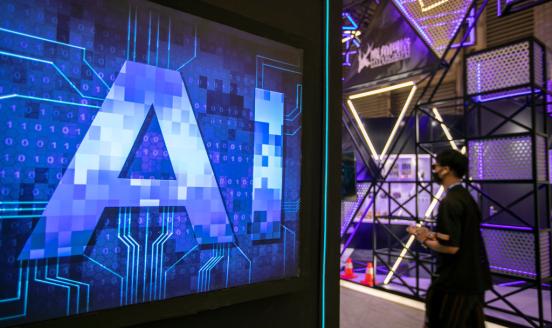Questions to Sylvie Goulard, Commissioner designate for Internal Market
If confirmed. Commissioner-designate Goulard will soon have direct responsibility for three areas within this broader mandate. Firstly, digital econom

European Commission President-elect Ursula von der Leyen has disseminated her mission letters to the commissioner-designates.
Under the mission letters, your responsibilities need to be understood in the context of the broader charter of a Europe Fit for the Digital Age. Executive Vice President-designate Margrethe Vestager has a dual role, first to coordinate a group of commissioners with relevant portfolios, and second to take personal and direct responsibility for the competition portfolio. In the former role, she coordinates all of your activities, and also those of commissioner designate Mariya Gabriel insofar as they relate to research and innovation.
Commissioner-designate Goulard, you have direct responsibility for three areas within this broader mandate. Firstly, digital economy and society. Secondly, European industry and the single market. And thirdly, the defence industry and space. Each of these is associated with its own DG, which in the case of defence and space will be a new DG. The promotion of European industry is one of your three mandates, but it also represents a common, over-arching theme across all three thematic areas.
As regards your digital economy and society role, supported by the Directorate-General for Communications Networks, Content and Technology (DG CNECT), your explicit responsibilities are: (1) contributing to work to enhance Europe’s technological sovereignty; (2) leading work on a coordinated European approach on artificial intelligence, (3) leading work on a new Digital Services Act; (4) building a real single market for cybersecurity, and a Joint Cyber Unit; and (5) contributing to an updated Digital Education Action Plan.
As regards your mandate to promote a future-ready European industry and single market, supported by the Directorate-General for Internal Market, Industry, Entrepreneurship and SMEs (DG GROW), you are (1) to contribute to a comprehensive long-term strategy for Europe’s industrial future, which is to be jointly coordinated by Executive Vice Presidents Vestager and Dombrovskis; (2) to ensure that a new Circular Economy Action Plan feeds into the EU’s overall industrial strategy; (3) to contribute to a new strategy to help SMEs to scale up and expand, including through improved access to finance; (4) to ensure the smooth day-to-day functioning of the single market, and in particular to look at any remaining barriers relating to goods and services and to help remove any artificial distinctions between new digital markets and more established markets; (5) to ensure a level playing field throughout the single market and contribute to the work addressing the distortive effects of foreign subsidies, in particular in relation to public procurement; (6) to review our intellectual property regime for continued fitness for purpose; and (7) to lead the Commission’s reflections on issues such as Europe’s technological sovereignty, particularly as regards defence and space.
As regards your defence industry and space mandate, supported by a new Directorate-General for Defence Industry and Space,[1] you are expected (1) to take responsibility for implementation and oversight of the European Defence Fund, (2) to focus on creating an open and competitive European defence equipment market, with particular emphasis on public procurement; (3) to lead (together with Transport) lead on the implementation of the Action Plan on Military Mobility; (4) to foster a strong and innovative space industry; (5) to implement the space programme, including Galileo, EGNOS, and Copernicus; (6) to use space assets such as Copernicus to enhance our ability to deliver on climate goals; and (7) to improve the linkage between space and defence and security.
Observations regarding the mission letter
The mission letter charges you with a great many explicit responsibilities. You are directly responsible for three significant Directorates-General, each of which can be expected to be highly visible. In the “Allocation of portfolios and supporting services”, which summarises the responsibilities of all 27 members of the college of commissioners in ten pages, a full two pages (i.e. some 20%) are dedicated to your charter. This is more than twice as much text as any other commissioner – no other commissioner has a mandate that remotely approaches yours in terms of the breadth of function or the degree of specificity. Maintaining focus is likely to be challenging.
At the same time, your degree of responsibility varies greatly among these nineteen tasks. In some, you have lead responsibility, subject to coordination or supervision by one or two Executive Vice Presidents. In others, you “contribute to” an activity. In still others, you do not appear to have an explicit deliverable but are to ensure that some specific policy is aligned with other EU existing or emerging policy initiatives.
The biggest problem with the mission letter as written is that the large scale, high impact strategic issues are buried among a great many lower impact tactical issues. It is easy to focus on the trees while losing sight of the forest. To the extent that the mission letter fails to sketch out the strategic challenges that are relevant, it falls short in setting a clear context for your mandate.
In a series of memos to the new commissioners, and especially in our memo to the new commissioner to the commissioner responsible for digital services, content and networks, we identify a number of strategic challenges and opportunities that are relevant to your broad mandate. These include:
- Pressure on technology supply chains from our global trading partners and competitors, due in large part to geopolitical rivalry between China and the United States, calling into question the EU’s technological sovereignty;
- The role of digitalisation in enabling and promoting sustainability, including by means of green ICTs, and thus contributing to environment and climate;
- Changes in the workplace driven by digitalisation, including job destruction, job creation, the shift away from full-time traditional employment, and a tendency to wage polarisation;
- The need to increase Europe’s capacity to safeguard its own security.
The issue of technological sovereignty is crucial for the coming five years, but the mission letter is vague and internally inconsistent. In your first thematic area (digital services), you are to “contribute to the work” by investing and contributing to standards. In the second thematic area (single market), you are to “lead the Commission’s reflections” on technological sovereignty, mainly in terms of your third area (defence and space), your third thematic area. Are you to lead, or only to contribute? And to what?
Technological sovereignty is a growing concern, and not just because the EU has been far less successful in creating business-to-consumer platforms such as Google, Amazon, Uber, and more. A larger issue relates to potentially transformative technologies such as artificial intelligence (AI), machine learning, robots, big data and the Internet of Things (IoT). The US shows interest in limiting access (even for close allies) to AI and robotics through restrictions on foreign direct investment (FDI), export controls, and visas for visiting professionals who wish to work in these areas. The recent Huawei experience shows that restrictions can be imposed abruptly with little or no warning and that they can be damaging. This is a threat to the EU, not just for China. The mission letter mentions technological sovereignty but fails to place sufficient emphasis.
Digitalisation can be expected to play a huge role in sustainability, climate and environment. In terms of consumption, there are opportunities to reduce consumption or to improve efficiency and to reduce waste. It is important not only to reduce or improve the use of energy but also to reduce or improve the use of materials (since materials play a large role in global warming). Large opportunities exist in transport, in agriculture, and in housing. Nearly all of these benefit from or depend on digitalisation. Opportunities to shift production of energy so as to reduce the emission of greenhouse gases are likewise dependent on digitalisation.
The changes in the workplace have many implications in terms of (1) ensuring adequacy and portability of social protection benefits, (2) cushioning the transition for workers, and (3) re-educating and re-training workers as they move from jobs that have become irrelevant to new forms of work that, in most cases, are heavily dependent on digital technology. Much of this responsibility rests elsewhere, but you play a role, for instance with digital education.
As regards defence, your mandate appears not to relate to defence per se (which is a member state competence), but rather to strengthen the EU’s defence and space industries. As the mission letter notes, the European defence industry generates a total turnover of €100 billion per year. Europe plays a substantial role in global arms exports, with France, Germany, Spain, the UK, and Italy all among the world’s top ten exporters in a typical year.[2] Overall military expenditures are significant, even if small in comparison to the United States – total military expenditure in Europe were some $364 billion out of a global total of $1822 billion USD in 2018. The new tools at your disposal to try to promote synergy across the EU’s industry have huge symbolic importance and significant practical significance, but they are limited relative to the scale of the industry – the new European Defence Fund, for instance, represents only about a half of one percent of the EU defence industry. In order to achieve transformative effect, it will be necessary to find ways to leverage the available resources.
Questions
Your mission letter, read together with that of Executive Vice President-designate Vestager, raises numerous questions. After introductory points, we address your three areas of responsibility (digital, single market, and defence and space).
- The arrangements between Executive vice president-designate Vestager and you are not unprecedented – her role is similar to that of Vice President Ansip in the previous Commission. But your reporting arrangements are complex, and you are subject in some cases to coordination from more than one Executive Vice President. Do you see any risks in juggling this seemingly complicated coordination?
- What new synergies do you see in closer integration between the DGs that explicitly within your remit with DG Research and DG COMP? The new reporting arrangements place DG CNECT within the same reporting structure as DG COMP (which is directly managed by Executive Vice President Vestager). When the regulation of electronic communications was introduced in 2002, COMP and the predecessor to CNECT had some shared responsibilities (notably under the Article 7 process). Can the new organisational structure unlock opportunities for positive cooperation between the two DGs? Conversely, does it raise risks a perceived of conflict of interest in terms of the EU’s approach to competition policy?
- How do you intend to strengthen Europe’s technological sovereignty? We see a need both to greatly enhance Europe’s self-sufficiency in key technologies such as AI, machine learning, and big data and to significantly broaden our sources of supply. The EU’s current deficiencies probably have more to do with challenges in the financing of innovation than with enhancing research capabilities. Issues include:
- Strengthening the ability of EU start-ups and scale-ups to achieve access to capital, to be able to issue Initial Public Offerings (IPOs), and when necessary to go bankrupt without unduly tying up human and financial resources for long period of time. Some of this falls within your remit in support of SMEs, while other parts are more closely linked to the Capital Markets Union (CMU).
- There is a clear linkage to the research portion of Commissioner-designate Gabriel’s research portfolio.
- What aspects of artificial intelligence are ripe for public policy interventions? Product and service liability rules for machine learning, perhaps? Are there areas where public policy intervention would be premature or ill-advised?
- You are to lead work on a Digital Services Act, but the mission letter for Ms Vestager speaks only of “upgrading our liability and safety rules for digital platforms, services and products as part of a new Digital Services Act”, while yours says nothing at all. What do you envision as comprising a new Digital Services Act? Should we expect a general overhaul of the E-Commerce Directive?
- What realistically can be achieved with cybersecurity in the new term? What is the proper role for the European institutions?
- What more can be done to benefit SMEs? The EU has SME instruments in the COSME programme and in Horizon 2020 (and in its successor), but these seem to leave gaps.
- The mission letter is, in our view, correct in calling for better integration of digital and non-digital markets, and in moving away from a focus on a purely digital single market. Are you aware of any specific opportunities to reduce asymmetries between digital and non-digital products and services that have not yet been exploited?
- Are you aware of any particular opportunities to strengthen the Single Market in terms of services? Among the “four freedoms”, the Single Market for services has historically been weak.
- The mission letter calls on you to deal with “the distortive effects of foreign subsidies, in particular in relation to public procurement”. What tools do you hope to employ? Are there opportunities to work with your fellow commissioners to apply other tools (trade measures, competition law) to put pressure on any third countries that fail to deal fairly with the EU? If so, can this be done without undermining the credibility or effectiveness of these tools?
- Intellectual property, including copyright, has been a fraught topic during the current legislative term. What more should be done? What is achievable?
- You are tasked with contributing to an updated Digital Education Action Plan. Given that the overall mandate of the European institutions is weak when it comes to education and training, what practical possibilities do you envision?
- How do you expect to work with your colleagues to foster the use of digitalisation to promote sustainability? How do you hope to better integrate the Copernicus earth observation programme into the process?
- Your mandate relative to the defence industry is large, but the new European Defence Fund is fairly small relative to the size of the industry. Do you see ways in which to leverage the Fund so as to achieve the kind of synergies that are sought across the European defence sector?
- What concretely can be done to better enforce EU public procurement rules on defence? What do you view as the key gaps today?
- The European Defence Agency (EDA) is not mentioned in your mandate, but many of your explicit responsibilities (including for instance the Action Plan on Military Mobility) clearly intersect with the EDA. How do you expect arrangements with the EDA to work?
- What synergies do you see between your new defence and space DG and the Permanent Structured Cooperation (PESCO)?
- You have expansive responsibilities not only to support and strengthen the EU’s space sector, but also to implement the EU’s navigation (Galileo and EGNOS) and earth observation (Copernicus) programmes. In an era of declining international cooperation, do you see a risk that tension with the United States regarding satellite navigation might again emerge? Do growing overall tensions with the US make it even more important than before that the EU maintain an independent satellite navigation capability?
[1] The “new” DG is not entirely new – large portions are being transferred from DG GROW.
[2] Based on SIPRI trend indicator values (TIVs).



